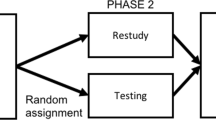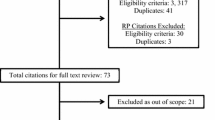Abstract
Previous research has shown that repeated retrieval with written tests produces superior long-term retention compared to repeated study. However, the degree to which this increased retention transfers to clinical application has not been investigated. In addition, increased retention obtained through written testing has not been compared to other forms of testing, such as simulation testing with a standardized patient (SP). In our study, 41 medical students learned three clinical topics through three different learning activities: testing with SPs, testing using written tests, and studying a review sheet. Students were randomized in a counter-balanced fashion to engage in one learning activity per topic. They participated in four weekly testing/studying sessions to learn the material, engaging in the same activity for a given topic in each session. Six months after initial learning, they returned to take an SP test on each topic, followed by a written test on each topic 1 week later. On both forms of final testing, we found that learning through SP testing and written testing generally produced superior long-term retention compared to studying a review sheet. SP testing led to significantly better performance on the final SP test relative to written testing, but there was no significant difference between the two testing conditions on the final written test. Overall, our study shows that repeated retrieval practice with both SPs and written testing enhances long-term retention and transfer of knowledge to a simulated clinical application.

Similar content being viewed by others
References
Bjork, R. A. (1994). Memory and metamemory considerations in the training of human beings. In J. Metcalfe & A. Shimamura (Eds.), Metacognition: Knowing about knowing (pp. 185–205). Cambridge, MA: MIT Press.
Butler, A. C. (2010). Repeated testing produces superior transfer of learning relative to repeated studying. Journal of Experimental Psychology. Learning, Memory, and Cognition, 36, 1118–1133.
Butler, A. C., & Roediger, H. L. (2007). Testing improves long-term retention in a simulated classroom setting. The European Journal of Cognitive Psychology, 19(4/5), 514–527.
Butler, A. C., & Roediger, H. L. (2008). Feedback enhances the positive effects and reduces the negative effects of multiple-choice testing. Memory & Cognition, 36, 604–616.
Carpenter, S. K., Pashler, H., & Cepeda, N. J. (2009). Using tests to enhance 8th grade students’ retention of U. S. history facts. Applied Cognitive Psychology, 23, 760–771.
Cepeda, N. J., Vul, E., Rohrer, D., Wixted, J. T., & Pashler, H. (2008). Spacing effect in learning: A temporal ridgeline of optimal retention. Psychological Science, 19, 1095–1102.
DeMaria, S., Jr, Bryson, E. O., Mooney, T. J., Silverstein, J. H., Reich, D. L., Bodian, C., et al. (2010). Adding emotional stressors to training in simulated cardiopulmonary arrest enhances participant performance. Medical Education, 44, 1006–1015.
Fallucco, E. M., Hanson, M. D., & Glowinski, A. L. (2010). Teaching pediatric residents to assess adolescent suicide risk with a standardized patient module. Pediatrics, 125, 953–959.
Feddock, C. A., Hoellein, A. R., Griffith, C. H., Wilson, J. F., Lineberry, M. J., & Haist, S. A. (2009). Enhancing knowledge and clinical skills through an adolescent medicine workshop. Archives of Adolescent and Pediatric Medicine, 163(3), 256–260.
Issenberg, S. B., McGaghie, W. C., Petrusa, E. R., Lee, G. D., & Scalese, R. J. (2005). Features and uses of high-fidelity medical simulations that lead to effective learning: A BEME systematic review. Medical Teacher, 27(1), 10–28.
Karpicke, J. D., & Blunt, J. R. (2011). Retrieval practice produces more learning than elaborative studying with concept mapping. Science, 331, 772–775.
Karpicke, J. D., & Roediger, H. L., I. I. I. (2007). Repeated retrieval during learning is the key to long-term retention. Journal of Memory and Language, 57, 151–162.
Karpicke, J. D., & Roediger, H. L., I. I. I. (2008). The critical importance of retrieval for learning. Science, 15, 966–968.
Kromann, C. B., Jensen, M. L., & Ringsted, C. (2010). The testing effect on skills might last 6 months. Advances in Health Sciences Education, 15(3), 395–401.
Larsen, D. P., Butler, A. C., & Roediger, H. L. (2008). Test-enhanced learning in medical education. Medical Education, 42(10), 959–966.
Larsen, D. P., Butler, A. C., & Roediger, H. L. (2009). Repeated testing versus repeated study: A randomized, controlled trial. Medical Education, 43(12), 1174–1181.
McDaniel, M. A., Agarwal, P. K., Huelser, B. J., McDermott, K. B., & Roediger, H. L., I. I. I. (2011). Test-enhanced learning in a middle school science classroom: The effects of quiz frequency and placement. Journal of Educational Psychology, 103, 399–414.
McGaghie, W. C. (2008). Research opportunities in simulation-based medical education using deliberate practice. Academic Emergency Medicine, 15, 995–1001.
McGaghie, W. C., Issenberg, S. B., Cohen, E. R., Barsuk, J. H., & Wayne, D. B. (2011). Does simulation-based medical education with deliberate practice yield better results than traditional clinical education? A meta-analytic comparative review of the evidence. Academic Medicine, 86, 706–711.
O’Sullivan, P., Chao, S., Russell, M., Levine, S., & Fabiny, A. (2008). Development and implementation of an objective structured clinical examination to provide formative feedback on communication and interpersonal skills in geriatric training. Journal of the American Geriatric Society, 56(9), 1730–1735.
Price, J. W., Price, J. R., Pratt, D. D., Collins, J. B., & McDonald, J. (2010). High-fidelity simulation in anesthesiology training: A survey of Canadian anesthesiology residents’ simulator experience. Canadian Journal of Anesthesiology, 57, 134–142.
Pyc, M. A., & Rawson, K. A. (2009). Testing the retrieval effort hypothesis: Does greater difficulty correctly recalling information lead to higher levels of memory? Journal of Memory and Language, 60, 437–447.
Roediger, H. L., I. I. I., & Butler, A. C. (2011). The critical role of retrieval practice in long-term retention. Trends in Cognitive Sciences, 15, 20–27.
Roediger, H. L., & Karpicke, J. D. (2006a). The power of testing memory: Basic research and implications for educational practice. Perspectives on Psychological Science, 1(3), 181–210.
Roediger, H. L., & Karpicke, J. D. (2006b). Test-enhanced learning: Taking memory tests improves long-term retention. Psychological Science, 17(3), 249–255.
Safdieh, J. E., Lin, A. L., Aizer, J., Marzuk, P. M., Grafstein, B., Storey-Johnson, C., & Kang, Y. (2011). Standaridized patient outcomes trial (SPOT) in neurology. Medical Education Online, 16. doi:10.3402/meo.v16i0.5634.
Schmidmaier, R., Ebersbach, R., Schiller, M., Hege, I., Holzer, M., & Fischer, M. R. (2011). Using electronic flashcards to promote learning in medical students: Retesting versus restudying. Medical Education, 45, 1101–1110.
Stevens, D. L., King, D., Laponis, R., Hanley, K., Zabar, S., Kalet, A. L., et al. (2009). Medical students retain pain assessment and management skills long after an experiential curriculum: A controlled study. Pain, 145(3), 19–24.
Tulving, E., & Thomson, D. M. (1973). Encoding specificity and retrieval processes in episodic memory. Psychological Review, 80, 352–373.
Wheeler, M. A., & Roediger, H. L. (1992). Disparate effects of repeated testing: Reconciling Ballard’s (1913) and Bartlett’s (1932) results. Psychological Science, 3, 240–245.
Zaromb, F. M., & Roediger, H. L. (2010). The testing effect in free recall is associated with enhanced organization processes. Memory & Cognition, 38, 995–1008.
Acknowledgments
This study was funded by an Educational Research Grant from the American Academy of Neurology and by the McDonnell Center for Systems Neuroscience at Washington University in St. Louis School of Medicine.
Author information
Authors and Affiliations
Corresponding author
Rights and permissions
About this article
Cite this article
Larsen, D.P., Butler, A.C., Lawson, A.L. et al. The importance of seeing the patient: test-enhanced learning with standardized patients and written tests improves clinical application of knowledge. Adv in Health Sci Educ 18, 409–425 (2013). https://doi.org/10.1007/s10459-012-9379-7
Received:
Accepted:
Published:
Issue Date:
DOI: https://doi.org/10.1007/s10459-012-9379-7




